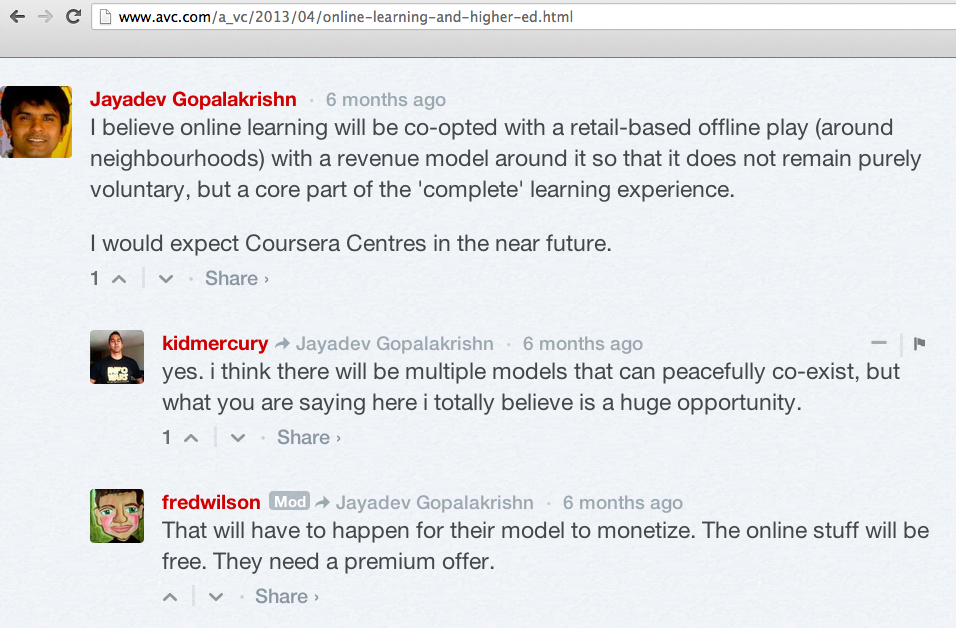Felt like a soothsayer reading the news this morning about Coursera's Learning Hubs. Six months back, I had posted my two cents around this opportunity under Fred Wilson's post on online education.
1. Improving completion rates through the use of facilitators in classes and the impact of a community of like-minded learners coming together, helping and motivating each other. The current completion rate for MOOCs hovers around 10% and is touted as the main reason why some call it a 'fad'. In-person intervention with timely assistance, it's believed, can help learners stay motivated and disciplined.
2. Bringing real-world classroom effects to a pure virtual environment - right from face-to-face discussions with peers and the social constructs around classrooms leading to debates, knowledge sharing, partnerships and meaningful relationships among learners.
3. Co-opting local stakeholders - educators and institutions, assuaging the alienation some feel about new learning platforms.
4. Experimenting with new models in blended learning, industry-academic partnerships, accreditation structures and customer acquisition. A retail presence offers flexibility to adapt product offerings for geo-specific opportunities.
These hubs have potential to become meeting grounds for future entrepreneurs, artists and thinkers to collaborate on new projects versus working in silos.
The opportunity for Coursera.
Coursera's Learning Hubs open up a new revenue stream and distribution opportunity for the company. Partnering with large institutions/colleges and keeping access free of cost while a good start, sustainability and scale could come from creating a more robust, for-profit services model built on top of the core (free) content. Centres could charge learners and companies an affordable a la carte fee for a range of ancillary services such as supplementary classes by experts, individual/corporate memberships for access to the facility, and placement support - just to name a few. With the model maturing over a period of time, professional educators in the locality will also see value in offering services in these centres on a revenue/profit sharing basis with Coursera.
In the medium to long term, it might not be presumptuous for us to expect the company appointing Learning Hubs run by credible edupreneurs with local market know-how and not just large institutions. This could be based on various licensing models (product/geographic-wise) and corresponding revenue/profit share structures.
So while the naysayers lament MOOCs being another bubble riding on the wave of internet success stories, brick-and-mortar centres lend yet another higher-level of authenticity for education's online evolution making it seem more 'accessible', real and acceptable in the ecosystem - to learners, teachers and corporates.
For an organization that's been around only for over a year now, Coursera seems to be making all the right moves for bringing credibility to online education, akin to what Amazon did for e-commerce in its early days. I wouldn't be surprised to see a Coursera centre in my neighbourhood in the near future.


 RSS Feed
RSS Feed